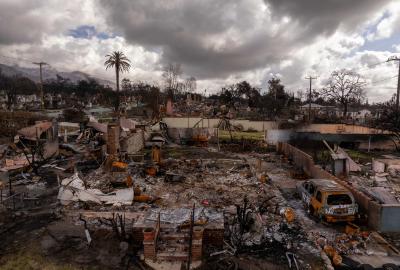Fox drops Tucker Carlson, but fake news lives on
What if we could "inoculate" people against believing climate lies? Evidence suggests we can.
Former Fox News host Tucker Carlson had a few favorite punching bags, and climate change was one of them.

For years, Carlson falsely told millions of viewers that “humans did not cause climate change” and “will never be able to control it.”
In fact, there is overwhelming scientific consensus that climate change is real and pollution created by human activities is the main cause.
But Carlson's departure from Fox will not end the spread of false and misleading information about climate change, which millions of people still see every day on social media.
“Bad actors are seeking to deflect, distract and deny efforts to save the planet,” says Melissa Fleming, UN Under-Secretary-General for Global Communications. "Disinformation, spread via social media, is their weapon of choice."
A slew of efforts are underway to combat the spread of false information, and some major social media platforms have started to make changes that can help.
Misinformation spreads rapidly on social media
Carlson specialized in bringing conspiracy theories from the extreme fringes of the internet into the mainstream. But even without his megaphone, false information still spreads rapidly on social media — even faster than the truth.

Studies have shown that social media encourages the spread of misinformation with systems that reward frequent sharing of emotionally charged content, regardless of its validity.
Long before Elon Musk took over Twitter, fake news spread six times faster than real news on the platform, according to a 2018 MIT study.
Another study estimated that climate misinformation is viewed up to 1.36 million times every single day just on Facebook. Most of this information comes from just 10 accounts.
A September 2022 investigation showed that TikTok searches pulled up videos containing misinformation 20% of the time. If a user entered the term “climate change,” for example, TikTok would automatically suggest searches for “climate change debunked” and “climate change doesn’t exist.”
What tech companies are doing to address misinformation
A global coalition called Climate Action Against Disinformation has been urging technology platforms and policy makers to counter the spread of false climate information. Pinterest was the first to step up. In June 2022, Pinterest became the first major social media platform to ban content that denies the scientific consensus on climate change.
In new guidelines that took effect in April, TikTok says it will take down content that "undermines well-established scientific consensus" about climate.
CAAD says that despite these promising first steps, technology companies and governments can do more to improve enforcement, transparency and accountability. And some CAAD members are developing their own tools to fight misinformation.
Inoculating people to stop the spread
Environmental Defense Fund, a CAAD member and climate advocacy group, spearheads the Anti-Misinformation Brigade, an army of social media users trained to spot and combat climate misinformation.
- Exposed: The social media hoax that tried to kill America's biggest ever climate law
- From doomscroller to changemaker: Five ways to fight climate change and be a better advocate
EDF is also developing content, such as ads and blog posts, aimed at helping people resist misinformation. The project is inspired by a body of cognitive research that suggests the spread of misinformation is viral and can be contained by “inoculating” people.
Researchers from Cambridge University found that YouTube viewers cut down on sharing false news after they were shown an “inoculation” video that warned of an impending misinformation attack. The video exposed the manipulation techniques being used and presented a “harmless microdose” of misinformation as an example — in one case, the classic “Blame Canada” scene from the animated television series South Park, to illustrate scapegoating.
EDF will test the effectiveness of inoculation theory in helping people spot misinformation about the transition to renewable energy, a favorite target for disinformers — those who purposely spread false or misleading information.
“Even without Tucker Carlson as their mouthpiece, a small group of bad actors are still working to delay climate action by spreading fake news,” says EDF’s disinformation expert Lauren Guite. “If people are aware of this threat, they can help stop the spread of misinformation and build support for climate solutions.”

